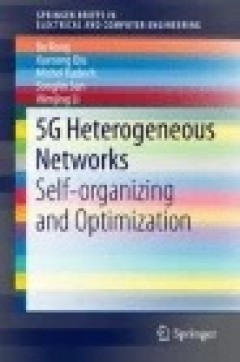Filter by

5G Heterogeneous Networks: Self-organizing and Optimization
This SpringerBrief provides state-of-the-art technical reviews on self-organizing and optimization in 5G systems. It covers the latest research results from physical-layer channel modeling to software defined network (SDN) architecture. This book focuses on the cutting-edge wireless technologies such as heterogeneous networks (HetNets), self-organizing network (SON), smart low power node (LPN),…
- Edition
- -
- ISBN/ISSN
- 978-3-319-39372-8
- Collation
- -
- Series Title
- SpringerBriefs in Electrical and Computer Engineering
- Call Number
- 621.38 FIV f

Engineering Electromagnetics
This book provides students with a thorough theoretical understanding of electromagnetic field equations and it also treats a large number of applications. The text is a comprehensive two-semester textbook. The work treats most topics in two steps – a short, introductory chapter followed by a second chapter with in-depth extensive treatment; between 10 to 30 applications per topic; examples a…
- Edition
- -
- ISBN/ISSN
- 978-3-319-07806-9
- Collation
- 842 b/w illustrations
- Series Title
- -
- Call Number
- -

Stochastic Petri Nets for Wireless Networks
This SpringerBrief presents research in the application of Stochastic Petri Nets (SPN) to the performance evaluation of wireless networks under bursty traffic. It covers typical Quality-of-Service performance metrics such as mean throughput, average delay and packet dropping probability. Along with an introduction of SPN basics, the authors introduce the key motivation and challenges of using S…
- Edition
- -
- ISBN/ISSN
- 978-3-319-16883-8
- Collation
- -
- Series Title
- -
- Call Number
- -

Energy Time Series Forecasting Efficient and Accurate Forecasting of Evolvin…
Lars Dannecker developed a novel online forecasting process that significantly improves how forecasts are calculated. It increases forecasting efficiency and accuracy, as well as allowing the process to adapt to different situations and applications. Improving the forecasting efficiency is a key pre-requisite for ensuring stable electricity grids in the face of an increasing amount of renewable…
- Edition
- -
- ISBN/ISSN
- 978-3-658-11039-0
- Collation
- 73 b/w illustrations, 19 illustrations in colour
- Series Title
- -
- Call Number
- -

Energy Management of Internet Data Centers in Smart Grid
This book reports the latest findings on intelligent energy management of Internet data centers in smart-grid environments. The book gathers novel research ideas in Internet data center energy management, especially scenarios with cyber-related vulnerabilities, power outages and carbon emission constraints. The book will be of interest to university researchers, R&D engineers and graduate stude…
- Edition
- -
- ISBN/ISSN
- 978-3-662-45676-7
- Collation
- 23 b/w illustrations
- Series Title
- -
- Call Number
- -

Energy Management in Wireless Cellular and Ad-hoc Networks
This book investigates energy management approaches for energy efficient or energy-centric system design and architecture and presents end-to-end energy management in the recent heterogeneous-type wireless network medium. It also considers energy management in wireless sensor and mesh networks by exploiting energy efficient transmission techniques and protocols. and explores energy management i…
- Edition
- -
- ISBN/ISSN
- 978-3-319-27568-0
- Collation
- 134 b/w illustrations, 50 illustrations in colour
- Series Title
- -
- Call Number
- -

Energy Informatics 4th D-A-CH Conference, EI 2015, Karlsruhe, Germany, Novem…
This book constitutes the refereed proceedings of the 4th D-A-CH Conference on Energy Informatics, D-A-CH EI 2015, held in Karlsruhe, Germany, in November 2015. The 18 revised full papers presented were carefully reviewed and selected from 36 submissions. The papers are organized in topical sections on distributed energy sources and storage, smart meters and monitoring, research lab infrastruc…
- Edition
- -
- ISBN/ISSN
- 978-3-319-25876-8
- Collation
- 92 b/w illustrations
- Series Title
- -
- Call Number
- -

Energy Efficient Smart Phones for 5G Networks
This book addresses current technology trends and requirements leading towards the next era in mobile communication handsets; and beyond that the book proposes innovative solutions that could be candidate solutions for 5G phones. It adopts a multidisciplinary and interdisciplinary stance towards handset design, a necessary ingredient if 5th Generation handset and services are to really take-off…
- Edition
- -
- ISBN/ISSN
- 978-3-319-10314-3
- Collation
- 38 b/w illustrations, 132 illustrations in colour
- Series Title
- -
- Call Number
- -

Energy Efficient Servers Blueprints for Data Center Optimization
Energy Efficient Servers: Blueprints for Data Center Optimization introduces engineers and IT professionals to the power management technologies and techniques used in energy efficient servers. The book includes a deep examination of different features used in processors, memory, interconnects, I/O devices, and other platform components. It outlines the power and performance impact of these fea…
- Edition
- -
- ISBN/ISSN
- 978-1-4302-6638-9
- Collation
- 103 b/w illustrations
- Series Title
- -
- Call Number
- -

Theory and Applications of Smart Cameras
This book presents an overview of smart camera systems, considering practical applications but also reviewing fundamental aspects of the underlying technology. It introduces in a tutorial style the principles of sensing and signal processing, and also describes topics such as wireless connection to the Internet of Things (IoT) which is expected to be the biggest market for smart cameras.
- Edition
- -
- ISBN/ISSN
- 978-94-017-9987-4
- Collation
- 67 b/w illustrations, 135 illustrations in colour
- Series Title
- -
- Call Number
- -
 Computer Science, Information & General Works
Computer Science, Information & General Works  Philosophy & Psychology
Philosophy & Psychology  Religion
Religion  Social Sciences
Social Sciences  Language
Language  Pure Science
Pure Science  Applied Sciences
Applied Sciences  Art & Recreation
Art & Recreation  Literature
Literature  History & Geography
History & Geography